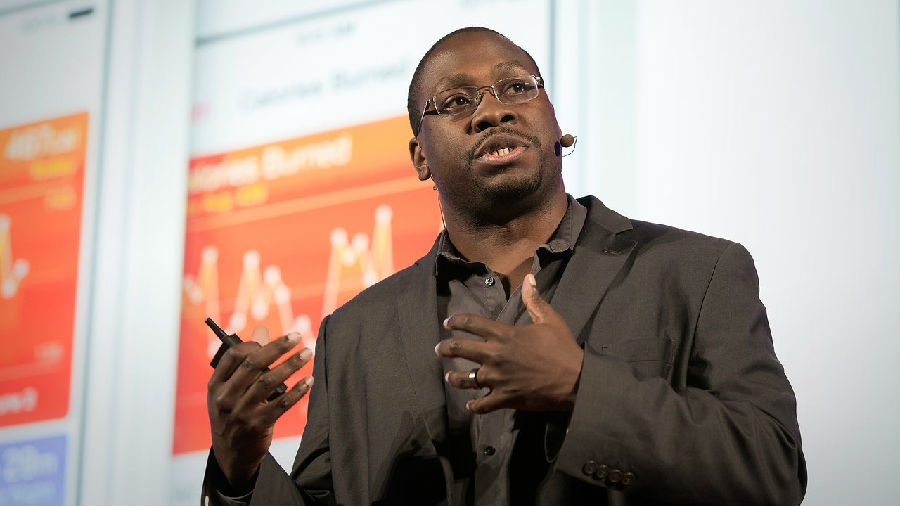(单词翻译:单击)
As a software developer and technologist, I've worked on a number of civic technology projects over the years.
作为软件开发者和技术专家,我在过去几年中参与了多个民用科技项目。
Civic tech is sometimes referred to as tech for good, using technology to solve humanitarian problems.
民用科技有时又被称为科技善举,是使用科技手段来解决民生问题。
This is in 2010 in Uganda, working on a solution that allowed local populations
这是2010年在乌干达,我们帮当地民众解决
to avoid government surveillance on their mobile phones for expressing dissent.
如何防止政府通过监控人们手机来控制不同政见的问题。
That same technology was deployed later in North Africa for similar purposes to help activists stay connected
相同的技术后来在北非得以使用,也用于类似的目的,来帮助社会活动家保持联络,
when governments were deliberately shutting off connectivity as a means of population control.
尤其是当政府以故意切断联络来作为控制民众的手段。
But over the years, as I have thought about these technologies and the things that I work on,
而多年以来,我常常想到这些科技以及我所做的这些事情,
a question kind of nags in the back of my mind, which is, what if we're wrong about the virtues of technology,
有个问题一直让我耿耿于怀,那就是我们有没有可能高估了科技的好处,
and if it sometimes actively hurts the communities that we're intending to help?
会不会有些技术实际上伤害了我们想去帮助的群体?
The tech industry around the world tends to operate under similar assumptions that if we build great things,
全球的科技行业都惯于在这个假设下运营,就是如果我们做出好的东西来,
it will positively affect everyone.
它就会对每个人有积极的影响。
Eventually, these innovations will get out and find everyone. But that's not always the case.
这些创新最终会走进千家万户。但其实并不一定如此。
I like to call this blind championing of technology "trickle-down techonomics," to borrow a phrase.
我把这种盲目的拥护称作“滴漏科技”,借用一个短语。
We tend to think that if we design things for the select few,
我们认为,如果我们为少数人设计产品,
eventually those technologies will reach everyone, and that's not always the case.
最终这些技术会波及到所有人,其实并不一定是这样的。
Technology and innovation behaves a lot like wealth and capital.
科技和创新很像财富和资本。
They tend to consolidate in the hands of the few, and sometimes they find their way out into the hands of the many.
它们通常集聚在少数人手中,有时可能普及到大众。
And so most of you aren't tackling oppressive regimes on the weekends,
既然在座的大多不会在周末去推翻高压政府,
so I wanted to think of a few examples that might be a little bit more relatable.
我在这里举一些更相关的例子。
In the world of wearables and smartphones and apps, there's a big movement to track people's personal health with applications
在这个充满智能手表、手机和应用软件的今天,有一个大趋势是追踪人们的健康,
that track the number of calories that you burn or whether you're sitting too much or walking enough.
利用应用软件来记录你消耗了多少卡路里,或是你是否坐的太久了,有没有走够路。
These technologies make patient intake in medical facilities much more efficient,
这种技术能帮助医疗机构更高效的用药,
and in turn, these medical facilities are starting to expect these types of efficiencies.
而反过来,这些医疗机构也开始预期这种效率。
As these digital tools find their way into medical rooms,
随着这些数字工具进入医疗室,
and they become digitally ready, what happens to the digitally invisible?
这些机构也日益数字化,那些无法实现数字化的怎么办?
What does the medical experience look like for someone who doesn't have the $400 phone or watch tracking their every movement?
就医经历对于那些买不起四百块钱的手机或手表的人来说会是怎样?他们怎么记录他们的一举一动呢?
Do they now become a burden on the medical system? Is their experience changed?
他们会否成为医疗系统的累赘?他们的经历会否改变呢?
In the world of finance, Bitcoin and crypto-currencies are revolutionizing the way we move money around the world,
在金融界,比特币和加密货币革新着货币流通的方式,
but the challenge with these technologies is the barrier to entry is incredibly high, right?
但这些技术面临的挑战是它们准入的门槛极高,对不对?

You need access to the same phones, devices, connectivity, and even where you don't,
你必须要有同款的手机,设备,连网能力,或者你没有的话,
where you can find a proxy agent, usually they require a certain amount of capital to participate.
你得有一个代理方,通常他们也会收取一定的费用。
And so the question that I ask myself is,
所以我常问自己的问题是,
what happens to the last community using paper notes when the rest of the world moves to digital currency?
当余下的世界都转用电子货币以后,最后一个用纸币的社会会怎样?
Another example from my hometown in Philadelphia:
另一个例子来做我的家乡费城:
I recently went to the public library there, and they are facing an existential crisis.
我最近去了那儿的图书馆,他们面临一个生死存亡的危机。
Public funding is dwindling, they have to reduce their footprint to stay open and stay relevant,
政府拨款日益萎缩,他们不得不以减少馆点来保证生存及不断更新,
and so one of the ways they're going about this is digitizing a number of the books and moving them to the cloud.
其中的一个措施是把一些书籍数字化,把它们储存到云端。
This is great for most kids. Right? You can check out books from home,
这对大多数孩子来说是好事,对不对?你可以在家借书,
you can research on the way to school or from school, but these are really two big assumptions,
你可以在上学或放学路上查资料,但是,这里面有两大假设,
that one, you have access at home, and two, that you have access to a mobile phone, and in Philadelphia, many kids do not.
第一,你在家能上网,第二,你拥有一个手机,而在费城,多数孩子两者都没有。
So what does their education experience look like in the wake of a completely cloud-based library,
这样的话,在这样一个完全云端的图书馆体系下,他们的求学经历会是怎样,
what used to be considered such a basic part of education? How do they stay competitive?
尤其是图书馆一向被视为教育系统不可或缺的一部分。他们如何能保持竞争力?
A final example from across the world in East Africa:
最后一个例子来自世界另一端的东非:
there's been a huge movement to digitize land ownership rights, for a number of reasons.
一个大趋势是把土地所有权数字化,这样做是基于各种原因。
Migrant communities, older generations dying off, and ultimately poor record-keeping have led to conflicts over who owns what.
迁徙型的社会,年长的一代逐渐逝去,以及糟糕的档案记录使得各方对所有权各持己见。
And so there was a big movement to put all this information online,
所以那里在推行把这些信息都放在网上,
to track all the ownership of these plots of land, put them in the cloud, and give them to the communities.
记录这些土地的所有权,然后存储在云端并交还给社区。
But actually, the unintended consequence of this has been that venture capitalists, investors, real estate developers,
但实际上,这种做法计划外的产物是,风险资本家,投资者,房地产开发商
have swooped in and they've begun buying up these plots of land right out from under these communities,
都涌了进来,开始大量买地,从当地人手里把地都买了,
because they have access to the technologies and the connectivity that makes that possible.
因为他们能接触到这个科技,并且有能力上网。
So that's the common thread that connects these examples,
所有这些例子的共同点,
the unintended consequences of the tools and the technologies that we make.
是我们创造的这些工具和科技的意外后果。
As engineers, as technologists, we sometimes prefer efficiency over efficacy.
作为工程师和技术人员,我们有时放弃功效而选择效率。
We think more about doing things than the outcomes of what we are doing. This needs to change.
我们想要做事情却不考虑事情的结果。这需要改变。
We have a responsibility to think about the outcomes of the technologies we build,
我们要对科技的后果负责,
especially as they increasingly control the world in which we live.
特别是当科技越来越多的控制我们的生活。
In the late '90s, there was a big push for ethics in the world of investment and banking.
在九十年代末的时候,投资和银行界都在推进道德。
I think in 2014, we're long overdue for a similar movement in the area of tech and technology.
我想在2014年,我们早也该有一个类似的推进运动,这回是在科技领域。
So, I just encourage you, as you are all thinking about the next big thing, as entrepreneurs, as CEOs, as engineers, as makers,
所以,我鼓励你们,当你们在考虑下一个大手笔,作为企业家,首席执行官,工程师,创造者,
that you think about the unintended consequences of the things that you're building,
请考虑一下计划外的后果,
because the real innovation is in finding ways to include everyone. Thank you.
因为真正的创新是想办法造福每个人。谢谢。


